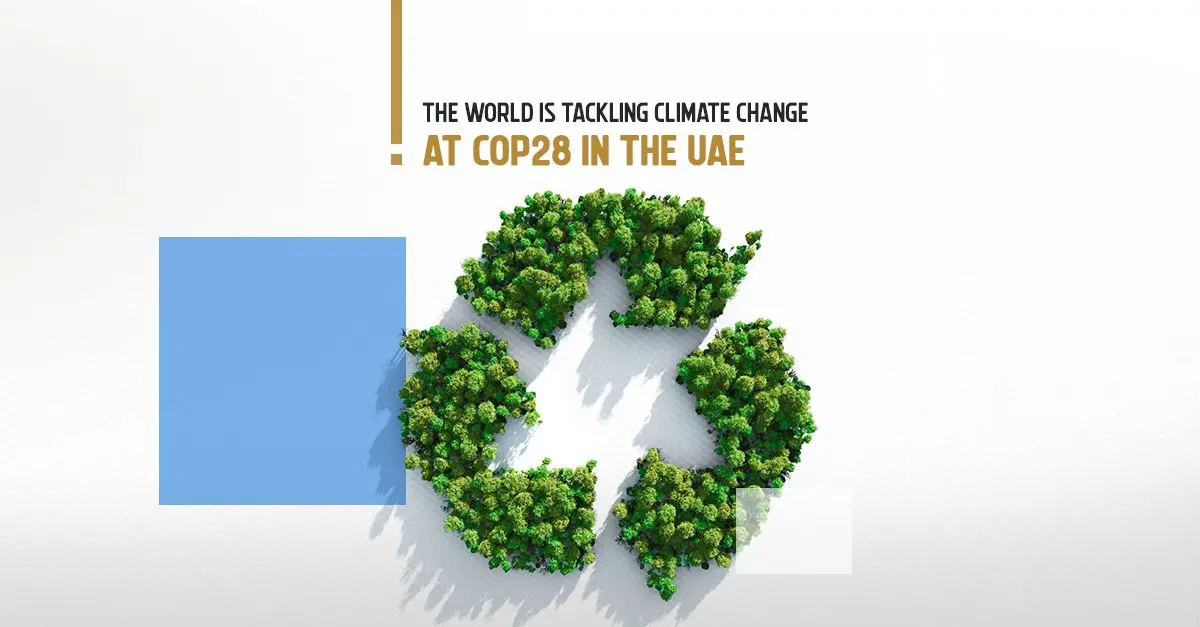


The globe has converged in a collaborative quest of sustainable solutions as the gleaming metropolis of Dubai hosts the vital COP 28. Leaders and dreamers assemble among the golden dunes of the desert to shape a future defined by climate resilience. Dubai, a bastion of innovation, is laying the groundwork for unprecedented talks on environmental stewardship. The city’s dedication to sustainability reflects the urgency and scope of worldwide efforts to battle climate change.Conference of the Parties (COP) is a series of United Nations Climate Change Conferences, which have been running since 1995.
COP is the name given to the United Nations Climate Change Conferences. The goal of these conferences is to review progress made by members of the United Nations Framework Convention on Climate Change (UNFCCC) to limit climate change.COP is the main decision-making body of the UNFCCC. It includes representatives of all the countries that are signatory partiesto the UNFCCC. COP assesses the effects of measures introduced by the Parties to limit climate change against the overall goal of the UNFCCC.
Simply said, the COP is where the world gets together to agree on methods to address the climate catastrophe, such as limiting global temperature rise to 1.5 degrees Celsius, assisting vulnerable populations in adapting to climate change consequences, and attaining net-zero emissions by 2050.More than 70,000 participants, including members of the UN Framework Convention on Climate Change (UNFCCC), are anticipated to attend COP28. Participants include business executives, young people, climate scientists, indigenous peoples, journalists, and a variety of other specialists and stakeholders.Officially, COP 28 refers to the 28th Conference of the Parties (COP) to the UN Framework Convention on Climate Change (UNFCCC).
UNFCCC & COP
The UNFCCC is an agreement between 197 countries of the United Nations. The agreement is to stabilize greenhouse gas concentrations at a level that would prevent dangerous anthropogenic (human-induced) interference with the climate system.The COP functioned as a critical worldwide venue for governments to confront the rising climate catastrophe until 2022. Delegates from across the world gathered each year to negotiate and execute policies aimed at reducing the effects of climate change. The Paris Agreement, a major agreement signed in 2015, remains a focal point, with member countries pledging to limit global temperature rises. Diverse talks on carbon reduction objectives, climate financing, and adaptation methods took place during COP meetings. Despite gradual improvement, difficulties remained, ranging from equal responsibility allocation to the urgent need for expedited action. As the globe battled with the impacts of climate change, the COP conferences emphasized the importance of collective, determined measures to ensure a sustainable future for future generations.
COP so far
Several notable successes have resulted from the United Nations Framework Convention on Climate Change (UNFCCC) Conference of the Parties (COP) sessions. Here are five important accomplishments. Perhaps the most significant success to date, the Paris Agreement was adopted at COP21 in Paris. This historic agreement brought together 196 countries, each promising to keep global temperature rises well below 2 degrees Celsius over pre-industrial levels, with attempts to keep it below 1.5 degrees. The agreement emphasizes NDCs for reducing greenhouse gas emissions and offers a framework for climate finance, technological transfer, and adaptation measures.
The Kyoto Protocol, adopted at the Third Conference of the Parties in Kyoto, Japan, was the first international pact to establish enforceable objectives for decreasing greenhouse gas emissions, mostly from wealthy countries. While it had limits and changed over time, it created the foundation for succeeding climate accords and established the notion of shared but differentiated responsibilities. At COP16 in Cancun, Mexico, the Green Climate Fund (GCF) was founded. The Global Climate Fund (GCF) is a funding institution that assists poor nations in their efforts to reduce and adapt to climate change. It is critical in attracting money from developed nations and allocating them to initiatives that promote long-term development and resilience.
Countries reaffirmed their commitment to the Paris Agreement at COP22 in Marrakech, Morocco, with the Marrakech Action Proclamation. The proclamation emphasised the significance of combating climate change and maintaining on track with the goals stated in the Paris Agreement. While the Kyoto Protocol contained restrictions, the Doha Amendment, agreed at COP18 in Doha, Qatar, extended the commitment time for certain developed nations’ emission reduction commitments. This extension ensured that climate change was addressed while discussions for a more comprehensive and inclusive accord continued.
These accomplishments are watershed moments in the global fight to battle climate change, displaying worldwide cooperation, dedication, and a common sense of the essential importance of addressing this crucial issue. It’s worth noting that ongoing COP meetings strive to build on these accomplishments and modify policies to address emerging difficulties.
It is not well recognized that India hosted one of these summits, COP8, in 2008. COPs used to be considerably simpler events, with simply climate negotiators and a few environment ministers in attendance. They were nothing like the high-profile spectacles that contemporary COPs have become. At least three of these, COP15 in Copenhagen in 2009, COP21 in Paris in 2015, and COP26 in Glasgow in 2021, attracted more than 100 heads of state or governments, making them the greatest gathering of world leaders ever.
COP28
By all accounts, 2023 is going to be the hottest year ever. The World Meteorological Organization predicts that, with less than a month till year’s end, global warming will reach 1.4 degrees Celsius above pre-industrial levels, dangerously near the 1.5-degree threshold established by the Paris Agreement. The end of another year marked by forest fires, droughts, and floods is near. In the upcoming years, will anything change? Much of it will rely on what transpires in approximately ten days in Dubai, when the 28th Conference of Parties of the UNFCCC comes to a close. Will nations muster the fortitude to overcome long-standing barriers in the complex geopolitical context of today, where short-term self-interests sometimes take precedence over the longer-term imperative of collective action?
In contrast to last year, India is not getting ready to suggest that the results of the COP28 climate meeting include a decision to phase out fossil fuels.India made the case at the Sharm el-Sheikh summit last year that all fossil fuels should be used less gradually and that coal should not be singled out for a phase-down. In this regard, it had presented a formal proposal. The action was taken a year after the Glasglow climate convention resolved to demand a reduction in the “unabated” usage of coal.Coal-fired power plants generate more than half of India’s electricity, and the country has insisted that coal will stay the backbone of the country’s electricity industry for a few more years.The scientific and activist communities enthusiastically embraced India’s proposal at Sharm el-Shaikh, which called for the phase-down of all fossil fuels, not just coal. Many nations, including the US and the EU, eventually decided to support it after first being hesitant. Nevertheless, it was ultimately rejected, presumably as a result of opposition from other nations like China.
Things are going well thus far in the meet. Delegates decided to operationalize the Loss and Damage Fund (LDF) on the first day. This financial and technology package will be utilized to address the now-unavoidable effects of climate change. The arduous course of climate negotiations is demonstrated by the fact that it took countries more than 30 years to achieve this demand of the nation’s most susceptible to global warming. A significant victory for the COP28 is the commitments made by a number of developed and developing nations to contribute approximately $550 million to the corpus. Still, there are a lot of unsolved questions.
To summarize, the COP conferences undeniably shaped the global response to climate change, yielding pivotal agreements such as the Paris Agreement and the Kyoto Protocol.These landmarks indicate a collective recognition of the critical need for long-term solutions and international cooperation. While we celebrate these accomplishments, we must remember that the path is continuous, with each COP session contributing to a shared commitment to a resilient and low-carbon future. The continuing teamwork and dedication shown at COP meetings will definitely play a pivotal role in leading the globe towards a more sustainable and climate-resilient path.


Alisha Verma is an Assistant Professor Senior Scale (Law).
Mr Mohit is working as an Assistant Professor of Law at Geeta Institute of Law, Panipat. He has done his Master’s in Law from Gurugram University, Gurugram and his Graduation in Law from Maharshi Dayanand University, Rohtak.